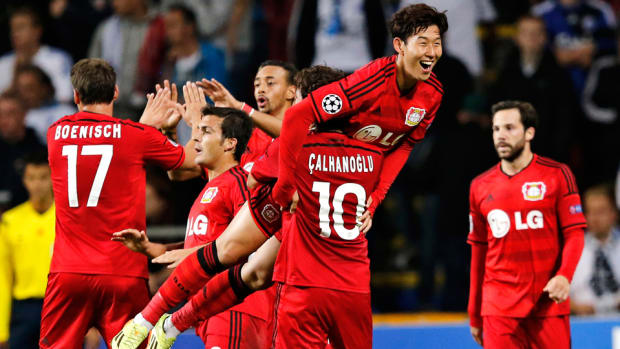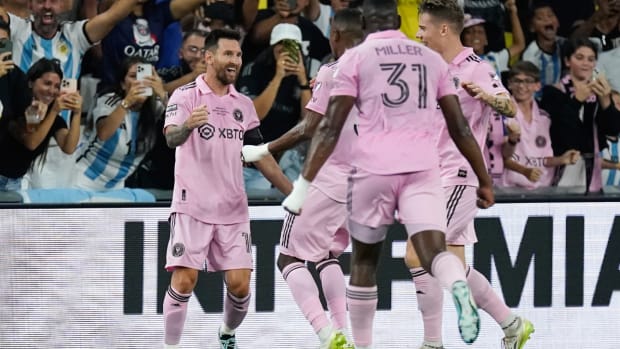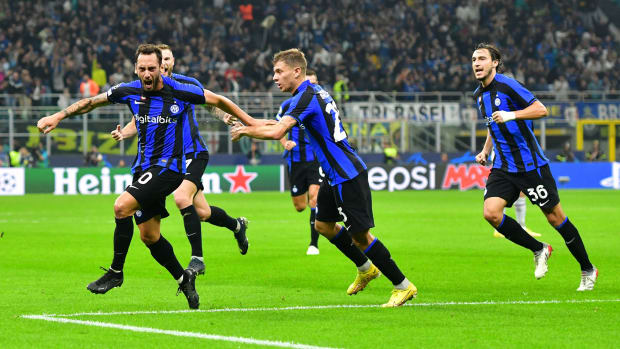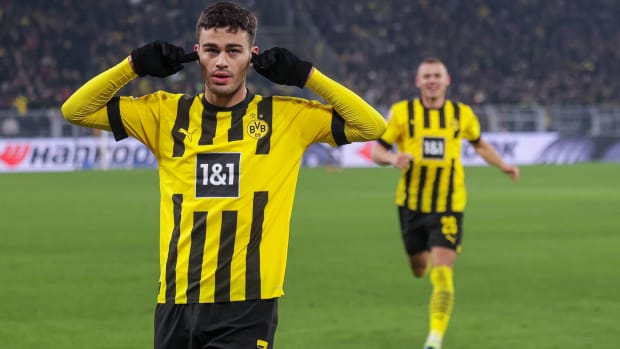Reasons for Star Players' Release and How USMNT Can Achieve Progress vs. Uruguay
ST. LOUIS — Heading into Tuesday evening’s friendly against Uruguay, coach Gregg Berhalter and the U.S. men's national team are simultaneously committed and resigned to playing a game that doesn’t resemble last Friday’s 3-0 loss to Mexico.
Pride and competitive spirit, tactics and the nature of the opposition and global football politics all have a role to play shaping the contest here at Busch Stadium, which will be the last before the USA enters the Concacaf Nations League next month.
It’s complicated. But when asked what he’s looking for Tuesday against Uruguay, the No. 5-ranked team in the world, the typically-detailed Berhalter offered just a one-word answer.
“Progress,” he said.
One obvious way to measure progress is the result. But there are others, and they matter as well. Berhalter said that many of those metrics (possession percentage, the number of shots, passes and touches in specific areas of the field, etc.) are critical to the way he wants the national team to play, and they weren’t nearly as ugly as the scoreboard against Mexico. The USA wants to keep and use the ball, and it did so for measurable stretches against El Tri. In the end, the Americans’ inability to create chances when they did break through the press, and then a couple of ill-timed turnovers, were crucial.
“I think it was a really good learning experience. I think it was a lot to build on,” Berhalter said here Monday. “I’m proud of the guys for working on executing a game plan and really determined to keep opening up and keep trying to play. I like how we moved Mexico around for portions of the game. … We didn’t give up many chances in the game. They didn’t create many chances in the game.”
The challenge on Tuesday will be to maintain that commitment to keeping the ball against a very different sort of opponent, while fielding a very different starting 11. Berhalter said he would’ve liked to have seen his squad attack the space left behind Mexico’s press a bit more directly at times, and that failing to exploit those opportunities was among the lessons from last week’s loss. The task against a compact and robust Uruguayan team will be just as taxing.
There will be no Luis Suárez, Edinson Cavani, or Diego Godín. But La Celeste is still loaded. Coach Óscar Tabárez’s roster features eight of the 11 players who started against France in the 2018 World Cup quarterfinals. Uruguay may lack the attacking prowess of Mexico, but it’ll be exceedingly difficult to break down. Some of the same patience the USA displayed at the Meadowlands, along with a bit more on-the-fly creativity, will be required.
"Mexico is a team that traditionally high presses, and Uruguay we don’t expect that to be the case,” Berhalter said. “Everything’s a challenge with them. Ground, space is a challenge with them. It’s a very physically aggressive team. It’s a very compact team. If I had to say, the biggest challenge would be space—the lack of space—and how you have to process quickly and you have to earn the space you get against them.”
The USA will meet that challenge with different personnel. Forward Josh Sargent, midfielders Cristian Roldan and Jackson Yueill, defender Tim Ream and goalkeeper Brad Guzan are expected to be among the new faces in Berhalter’s XI. The turnover is necessitated in part by Berhalter’s decision to send Christian Pulisic, Weston McKennie, Zack Steffen, John Brooks and Alfredo Morales back to their clubs.
Brooks and Morales returned to Germany with groin issues, but Pulisic, McKennie and Steffen are healthy. They’re also crucial components of Berhalter’s core. Considering the complexity of his system and the repetitions obviously required to master it, the manager said it wasn’t easy to return those players to their clubs. But his project is a long-term one, so that’s how he addressed this issue.
“It’s a delicate thing, because I know people want us to win. I understand that. I’m not foolish,” he told SI.com. “But we also have a process we have to go through. We have to do this if we want to get to where we want to get to.”
Steffen’s situation is the simplest of the three. Fortuna Düsseldorf has a game Friday against Wolfsburg that the goalkeeper almost certainly would’ve missed if he played against Uruguay three days earlier.
“In this particular case, I understand,” Berhalter said.
In Pulisic’s case, Berhalter said he placed a higher value on the player’s continued growth and integration at Chelsea, which visits Wolverhampton Wanderers on Saturday.
“There’s very high expectations on his performance at [Chelsea]. There’s a lot of competition for places at his club, and we felt he would benefit from being there the full week in training to be able to prepare for his game on the weekend,” Berhalter said. “It’s a sacrifice. It hurts me that Christian can’t be here. But if I look at the long term, it’s probably more important for Christian to be playing 40 games for Chelsea this year than one game against Uruguay.”
McKennie’s situation was the toughest, Berhalter said. The midfielder originally was supposed to remain in U.S. camp for the duration.
“The communication came late from the club,” Berhalter explained. “Schalke came to us and said, ‘Can you please accommodate this wish? We’ve had a terrible start to the last couple seasons. We have an absolutely crucial game against Paderborn [on Sunday], where we need to win this game and we’d love to have him for the preparation.’
“This was the hardest one,” Berhalter continued. “Reluctantly, we said 'O.K.' We didn’t want to say 'O.K.’, but we also understand that this is a longer-term relationship.”
Maintaining and strengthening those relationships, and giving in on occasion—even when it hurts in the short run—can benefit the national team as well, Berhalter said.
“You’re working with the clubs—working with them on bigger types of projects on how to develop a player,” he explained. “We’re sharing data with them. We’re sending performance guys to the clubs to see how they work, to give advice about the player. It just creates a better working relationship, which we think is very important.”
The worst-case scenario, he said, is that we see a few different faces in the lineup against Uruguay.
“And that’s not a bad thing,” he said.
Roldan, the Seattle Sounders midfielder who’s already appeared in 10 matches under Berhalter, spoke before training Monday about the difficult balance the manager must try to maintain.
“Guys that have been here have an advantage. It’s tough to come in and have three days to prepare for a game if you’re new to the process,” Roldan told SI.com. “I’ve been under Gregg since January, so I have an advantage. I have the knowledge that some of the guys are in the process of learning, and sometimes it’s tough, because you have to almost skip through certain things because it’s so complex.”
The intermittent and evolving nature of national team rosters is one reason why some may think this is all too high a hill to climb. Games like last Friday’s, when the USA might have secured a draw by conceding possession and playing more directly and defensively, are another. But Roldan, for one, believes.
“It’s possible with time. Obviously you have to use the games to get better and implement the style and tactics that we want to play. We know it’s a process, and unfortunately we don’t get to see each other each and every day. So it is tough,” he said.
“But we want to be in control, and in the end, that’s what the system is about and I think all of the players are bought into that,” the midfielder added. “We are willing to maybe sacrifice a scoreline here or there to get better as a nation, and to get better with the process.”






